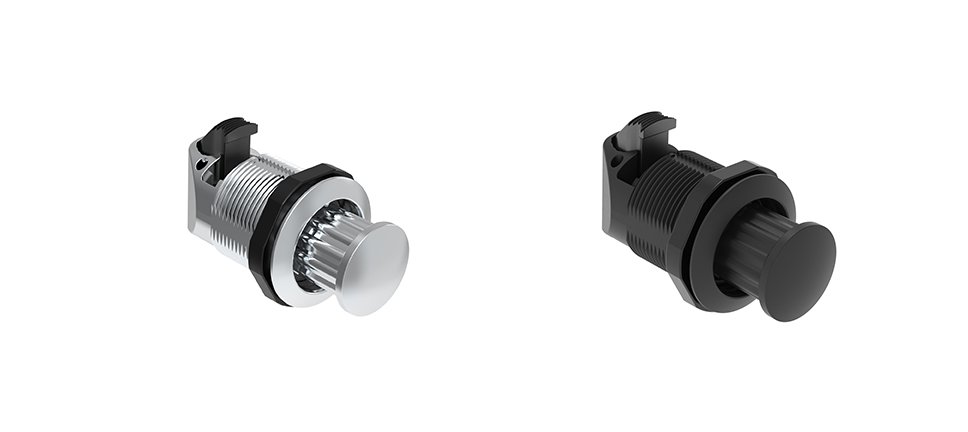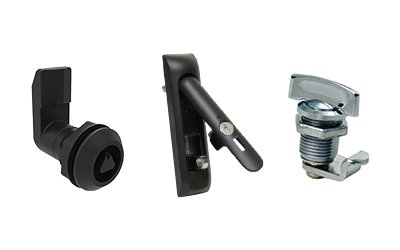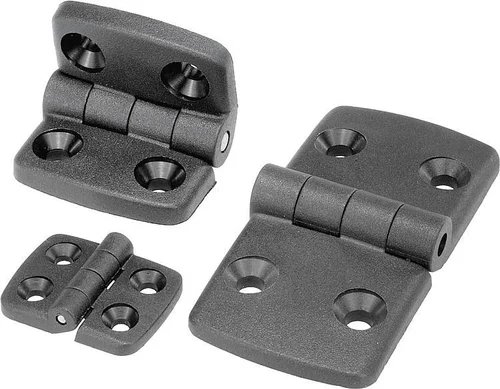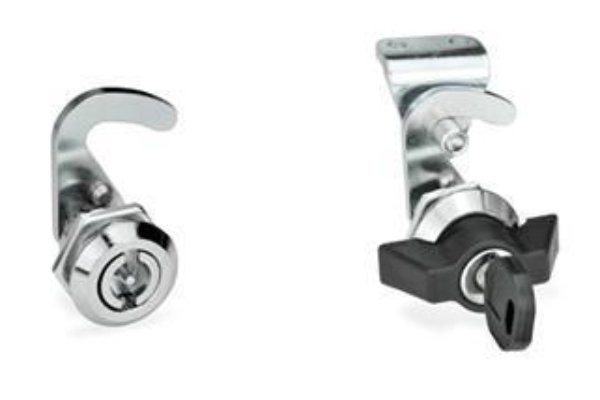Push to Close Latches are essential components in modern industrial and commercial environments, ensuring that doors, panels, and enclosures remain securely closed with a simple push. These latches are highly effective in applications that require reliable locking mechanisms without the need for manual twisting, turning, or additional hardware. For B2B buyers, selecting the right push-to-close latch can improve operational efficiency, enhance safety, and ensure the longevity of equipment. In this guide, we will explore the different types of push-to-close latches, their benefits, installation procedures, and applications in industries such as electrical cabinet doors.
What Are Push-to-Close Latches?
Push to Push-to-Close latches, as the name suggests, are designed to automatically close and lock doors or panels when pressure is applied. These latches utilize a spring mechanism that securely holds the door or panel in place once it is pushed. Unlike traditional latches that require turning a handle or twisting a knob, a push-to-close latch works with a simple push, offering both ease of use and efficiency.
Push to Close Latches are available in various designs, each suited for specific applications. They are primarily used in industrial environments, electrical cabinets, and automation equipment, where secure closure is essential, but the ease of access is equally important.
Types of Push-to-Close Latches
In the B2B market, different types of Push to push-to-close latches are available to meet the specific needs of various industries. Two of the most commonly used types are Paddle Latches and Knob Latches. Each type offers unique features that cater to different operational needs.

1. Paddle Latches
Paddle Latches are large, durable latches designed for use on large doors or panels. These latches feature a paddle-shaped handle that can be pressed or pushed to engage the locking mechanism. Paddle Latches are particularly suitable for heavy-duty applications where the latch needs to withstand significant forces and vibrations.
Features of Paddle Latches:
- Heavy-Duty Design: Paddle Latches are built to handle larger, heavier doors or equipment, making them ideal for industrial and commercial applications.
- Easy Operation: The paddle handle allows for easy, tool-free operation. Simply press the paddle to close the latch, and it will lock automatically.
- Durability: Typically made from stainless steel or other corrosion-resistant materials, Paddle Latches are designed to withstand harsh environments, including high vibrations, temperature fluctuations, and exposure to chemicals.
Common Applications for Paddle Latches:
- Industrial Electrical Cabinets: Paddle Latches are commonly used in electrical enclosures and control panels to ensure secure closure of cabinets storing sensitive electrical components.
- Heavy-Duty Equipment: In applications such as machinery and automated systems, Paddle Latches are ideal for providing secure closure and preventing accidental opening during operation.
- Outdoor Enclosures: Paddle Latches are used on outdoor storage units and cabinets to ensure safety and reliability, even in exposed conditions.
2. Knob Latches

Knob Latches feature a smaller, more compact design compared to Paddle Latches. These latches are activated by rotating or pressing a knob, making them ideal for applications where space is limited or where a more subtle locking mechanism is preferred.
Features of Knob Latches:
- Compact and Space-Saving: Knob Latches are perfect for smaller doors or equipment where a large latch might not be suitable.
- Ease of Use: Like Paddle Latches, Knob Latches allow for quick, tool-free operation. A simple push or turn of the knob is sufficient to secure the latch.
- Variety of Designs: Knob Latches come in various materials and finishes, including stainless steel, plastic, and aluminum, making them adaptable to a range of environments.
Common Applications for Knob Latches:
- Small Electrical Cabinets: In compact electrical enclosures or small electrical panels, Knob Latches are a great option for securing the door without taking up too much space.
- Server Racks: Data centres and IT facilities often use Knob Latches on server racks, where quick access is required, but security is still a priority.
- Storage Cabinets: For lighter-duty applications, such as storage cabinets, Knob Latches are ideal for providing secure closure without excessive complexity.
Advantages of Push-to-Close Latches
For B2B buyers, understanding the advantages of Push to push-to-close latches can help in making informed decisions about their applications in different industries. These latches offer several key benefits that make them highly desirable in various industrial, commercial, and electrical environments.
1. Improved Operational Efficiency
Push to--Close latches simplify the process of securing doors and panels, reducing the time and effort required for routine operations. This leads to greater overall efficiency in industries where doors need to be frequently opened and closed, such as electrical cabinets, industrial machinery, and automated systems.
- Quick Access: In fast-paced environments, employees or technicians can easily close doors with a push, which reduces the need for additional steps like twisting handles or locking mechanisms.
- Hands-Free Operation: Push to Close Latches can often be engaged with one hand, allowing workers to keep their other hand free for carrying tools or performing other tasks.
2. Durability and Reliability
One of the key advantages of Push to Close Latches is their durability. These latches are designed to withstand repeated use and remain reliable even in challenging environments. They are often made of high-quality materials, such as stainless steel or zinc-plated steel, which provide resistance to corrosion and wear.
- Long-Lasting Performance: The robust materials and simple mechanical design of Push to-close latches ensure they last for many years, reducing the frequency of replacements and maintenance.
- Vibration Resistance: These latches are designed to perform well in environments with high vibrations, such as industrial machinery or electrical cabinets, ensuring that doors stay securely closed.
3. Space Efficiency
Push to Close Latches, particularly Paddle Latches, are designed to be compact and efficient, helping to optimize space in various applications. Their minimalistic design ensures that no additional space is needed for protruding handles or locking mechanisms, making them ideal for environments where space is limited.
- Slim Design: Push to Close Latches are ideal for areas where every inch of space counts, such as in compact enclosures, server racks, and smaller cabinets.
- No External Handles: The absence of external handles or locks allows for a cleaner, more organized aesthetic, especially important in modern industrial environments where design and space utilization are critical.
4. Enhanced Safety and Security
Push to Close Latches help improve safety by ensuring that doors remain securely locked when closed. In electrical cabinets, for example, the secure closure of doors prevents unauthorized access to potentially dangerous electrical components.
- Automatic Locking: Push to Close Latches lock automatically when the door is pushed shut, eliminating the risk of accidentally leaving the door open.
- Prevention of Unauthorized Access: These latches provide an added layer of security, particularly in environments where sensitive or hazardous materials are stored.
5. Reduced Maintenance Costs
With fewer moving parts and a more straightforward locking mechanism, push-to-close latches are less likely to break or malfunction compared to traditional latches. This leads to a reduction in the overall maintenance costs for businesses.
- Fewer Failures: The simple mechanical nature of Push to Close Latches makes them more reliable and less prone to failure, reducing the need for costly repairs.
- Lower Replacement Costs: Due to their longevity and durable design, these latches need to be replaced less frequently, which translates into cost savings for businesses in the long run.
How to Install Push-to-Close Latches
Installing a Push to Close Latch is relatively simple, but it requires precise measurements and alignment to ensure proper functionality. Below are the steps to guide you through the installation process:
1. Choose the Right Latch Type
- Before starting the installation, determine the type of Push to Close Latch you need. Consider the size of the door, the weight, and the operational requirements of your application. For larger doors, Paddle Latches are ideal, while smaller enclosures or cabinets may benefit from Knob Latches.
2. Prepare the Door and Frame
- Measure and Mark: Measure the appropriate position for the latch on the door and the corresponding strike plate on the door frame. Ensure that the latch will align correctly with the frame when installed.
- Drill Holes: Drill holes for the latch and strike plate according to the manufacturer’s specifications. Be careful to drill straight and properly sized holes to ensure a snug fit.
3. Install the Latch
- Mount the Latch: Attach the latch to the door by inserting screws through the mounting holes. Tighten the screws firmly but avoid over-tightening, which could damage the latch or the door.
- Install the Strike Plate: Attach the strike plate to the door frame, ensuring it aligns perfectly with the latch mechanism on the door.
4. Test the Latch
- After installation, test the latch to ensure it engages and locks properly. Push the door to close it and verify that the latch automatically locks the door. Make any necessary adjustments to ensure smooth operation.
Applications of Push-to-Close Latches in Electrical Cabinet Doors
Push to Close Latches have become essential components in securing electrical cabinet doors. These latches provide quick and reliable closure, ensuring that electrical panels remain secure and that workers can access them safely and efficiently.
Benefits of Electrical Enclosures:
- Safety: Push-to-Close Latches help prevent accidental access to live electrical circuits, reducing the risk of electric shock or damage to equipment. This is particularly critical in environments like power distribution cabinets and electrical control panels where safety is paramount.
- Ease of Use: Technicians working in environments with electrical enclosures can easily close doors with a simple push, without needing additional tools or complex mechanisms. This increases efficiency and minimizes downtime.
- Compliance: Many push-to-close latches meet industry standards for electrical safety and protection, ensuring compliance with local and international safety regulations (e.g., UL, IEC). This is essential for businesses that need to maintain high standards of safety and avoid potential legal or financial penalties.
Real-World Examples in Electrical Cabinets:
- Power Distribution Cabinets: Push to Close Latches are commonly used in power distribution cabinets to secure electrical components. These cabinets often house live electrical circuits and require safe and quick access for maintenance workers. With push-to-close latches, workers can easily access these areas while ensuring the doors stay securely closed to prevent accidental contact with dangerous components.
- Control Panels: In industrial control panels used for automation systems, Push-to-close latches ensure that sensitive equipment is secured. These panels often require frequent access to perform diagnostics, upgrades, or repairs. The latches provide a fast, reliable way to close the doors after access is completed, ensuring that the panel remains secure while minimizing downtime.
- Server Racks in Data Centers: Push to Close Latches are also used in server racks, which house crucial IT equipment. With quick and secure closure, Push to Close Latches provide both security and ease of access for IT professionals who need to frequently open and close racks for maintenance or troubleshooting.
Hingelocks: Your Trusted Provider of Push-to-Close Latches
At Hingelocks, we specialize in providing high-quality Push to push-to-close latches for a wide range of industrial, commercial, and electrical applications. Our extensive selection includes both Paddle Latches and Knob Latches, each designed to meet the specific needs of our B2B clients. We understand the importance of secure and reliable enclosure solutions, which is why we ensure all our products are built with durability, safety, and ease of use in mind.
For more information about our Push to Close Latches or to explore our full range of products, please visit our official website: www.hingelocks.com.
Whether you need a Paddle Latch for heavy-duty industrial applications or a Knob Latch for smaller enclosures, Hingelocks has the right solution to meet your needs. Our latches are designed to provide secure closure and easy access, helping businesses reduce maintenance costs and improve operational efficiency.
Conclusion
Push to Close Latches have become essential components in industrial, electrical, and commercial applications, offering a range of benefits including ease of use, security, durability, and space efficiency. Whether used in electrical cabinet doors, machinery enclosures, or server racks, these latches provide reliable and quick closure while reducing maintenance costs and improving overall operational efficiency.
By selecting the right type of Push to Close Latch for your business needs—whether it's a Paddle Latch for heavy-duty doors or a Knob Latch for more compact enclosures—you can ensure the safety and security of your equipment while also enhancing the accessibility for workers.
For businesses seeking reliable and durable latching solutions, Hingelocks offers a comprehensive range of high-quality latches to meet diverse needs. Visit Hingelocks.com to learn more and find the right Push to Close Latch for your application.







